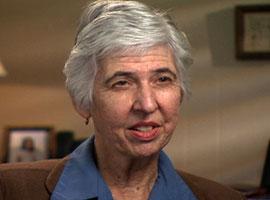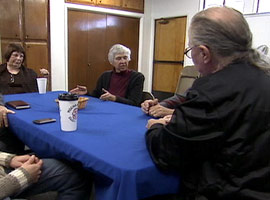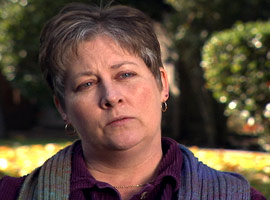In This Episode << SLIDE LEFT TO SEE ADDITIONAL SEGMENTS
Ministering to Sex Offenders
SAUL GONZALEZ, correspondent: With a buffet table topped with potluck dishes and guests catching up and sharing stories, this holiday gathering at Fresno, California’s Mennonite Community Church looks like a traditional church social. Traditional, that is, until you learn that many of the guests here tonight, like Robert Wilson, are convicted rapists and child molesters, all out of prison and on parole.
ROBERT WILSON: I had a lewd and lascivious act with a minor. It was my child. And when we get together like this, yeah, it’s a good thing. Nobody else out there on the streets are going to accept us and let us come into their little private parties and stuff because of who we are.
GONZALEZ: This gathering is the work of a faith-based program called Circles of Support and Accountability or COSA. It wants to create a new model for how society deals with sex offenders by offering the offenders help and friendship.
(speaking to Rev. Clare Ann Ruth-Heffelbower): You are working with men who society thinks of as the worst of the worst of the worst.
 REV. CLARE ANN RUTH-HEFFELBOWER: Yes, it’s true, and even the worst of the worst of the worst are human beings, and they can change.
REV. CLARE ANN RUTH-HEFFELBOWER: Yes, it’s true, and even the worst of the worst of the worst are human beings, and they can change.
GONZALEZ: Clare Ann Ruth-Heffelbower, an ordained Mennonite pastor, is the founder of Fresno’s COSA program.
HEFFELBOWER: We believe that it is possible for people to change. We’ve seen people change, and we believe coming from a faith perspective, that people created in God’s image have that good in them that can be there if they are given an opportunity to let that develop.
(at COSA meeting): “God, grant me the serenity to accept the things I cannot change…”
GONZALEZ: First started by Canadian churches in the mid 1990s, COSA’s work with sex offenders centers on small discussion circles that meet weekly. In the circles, four to six volunteers from the community are matched with one sex offender, called a core member. In this circle the offender is named John.
JOHN: And I screwed up and I made some bad choices because I become careless and I become complacent, and that is something that anybody that’s in my situation cannot do.
GONZALEZ: The circles are intended to get recently paroled sex offenders to take responsibility for the crimes they’ve committed and provide them material and moral support as they attempt to reenter the community.
JOHN: I can talk about anything, anything.
GONZALEZ: Anything.
JOHN: Anything. I told them things about me that I wouldn’t tell my closest friend.
 (speaking to group at COSA meeting): I don’t want to get into debates. That’s not being helpful for the core member.
(speaking to group at COSA meeting): I don’t want to get into debates. That’s not being helpful for the core member.
GONZALEZ: John, who didn’t want his face shown or last name used, molested half a dozen children, including his own daughter. He says after decades of his making excuses, COSA has forced him to confront the ugliness of his crimes.
JOHN: I was the one that caused the harm. It wasn’t their fault. It was easy to pick up on children that were feeling abandoned, neglected, and unhappy, because I had…
GONZALEZ: You targeted the vulnerable.
JOHN: Yeah. I targeted the vulnerable. It was easy.
GONZALEZ: Most of the sex offenders in COSA, who all volunteer for the program, say while serving time they received little or no counseling.
BEN: They might call them correctional facilities and rehabs. There’s no correcting, there’s no rehabbing going on.
GONZALEZ: You didn’t get any help?
BEN: There’s no help going on in there.
GONZALEZ: This man, who we’ll call Ben, is a former teacher convicted of multiple child molestation charges. He says too many sex offenders come out of prison with the same urges they had going in.
BEN: They know if they are going to offend again or not. They know it, you know, and they can fool themselves and maybe think they don’t need any kind of support group. But they really need it.
GONZALEZ: There are more than 700,000 registered sex offenders in the United States, with more than 100,000 of them living in California. In California, like other states, paroled offenders are required to wear GPS ankle bracelets. Offenders must also follow strict residency restrictions, preventing them from living within 2,000 feet of schools and parks. Unable to find apartments that don’t violate the residency restrictions, many men have wound up on the streets, creating entire tent cities of sex offenders. Parole agent Andy Mounts and his partner showed us one encampment. They introduced us to Michael, a paroled rapist.
 (speaking to Michael and Andy Mounts): In this homeless encampment, what percentage of the people living here are sex offenders?
(speaking to Michael and Andy Mounts): In this homeless encampment, what percentage of the people living here are sex offenders?
MOUNTS: Michael, what do you think?
MICHAEL: I would say almost all of them.
GONZALEZ: All of them. Almost all of them.
MOUNTS: One or two are not. If you see 50 tents, Michael—47 or 48 sex offenders?
MICHAEL: Yeah.
GONZALEZ: Is it good for the public, please don’t take offense, Michael, but people like you and others are out here instead of in an apartment or a home or in a more stable living situation?
MOUNTS: I can’t tell you that it is.
GONZALEZ: You can’t tell me that it is.
MOUNTS: That it’s good.
GONZALEZ: It’s this reality that COSA says it’s trying to remedy.
HEFFELBOWER: As long as we keep pushing sex offenders to the edge of the community, we’re putting them at risk of reoffending. An offender who has positive, pro-social relationships is less likely to reoffend than someone who doesn’t have those relationships in place. Now that’s seems to me like sort of a, duh, everyone should know that. But that’s what COSA is about, to fill in the social gap.
GONZALEZ: And it appears to work. A recent study of COSA in Canada showed a sharp decline in recidivism rates among sex offenders involved in the program. COSA volunteers who help the sex offenders are often motivated by a combination of religious faith and a wish to protect their families and communities. Some COSA volunteers have also had a very personal experience with sexual abuse—as victims.
 ALICIA HINTON: I really want these men to know they are accountable to me personally for not creating another victim.
ALICIA HINTON: I really want these men to know they are accountable to me personally for not creating another victim.
GONZALEZ: Until it became too emotionally taxing for her, Alicia Hinton, a victim of childhood sexual abuse, was a COSA volunteer. Although she stills sits on COSA’s board and believes strongly in its work, Hinton thinks some of COSA’s sex offenders still haven’t confronted their crimes and guilt.
HINTON: It was difficult for them to face me every week, and they didn’t want to talk about it with me.
GONZALEZ: They make excuses.
HINTON: They make excuses. They make lots and lots of excuses. It’s always somebody else’s fault, and it disgusts me. It disgusts me.
GONZALEZ: As paroled sex offenders return to communities and neighborhoods, one question often dominates. Can people who committed such heinous crime be rehabilitated to a point where they won’t harm others ever again? Unfortunately, it’s a question with no easy answer. For Heffelbower and many others who work with sex offenders, there’s no such thing as a complete “cure.”
HEFFELBOWER: It’s like an alcoholic. An alcoholic can be in recovery, but they can’t forget that they are an alcoholic, and so I think whichever perspective you take…
GONZALEZ: Meaning the impulses are…
HEFFELBOWER: Meaning the impulses may be there, but you learn how to manage them and keep them from acting on them.
GONZALEZ: COSA’s offenders acknowledge their struggles.
 (speaking to Ben): You do have thoughts that still make you uncomfortable?
(speaking to Ben): You do have thoughts that still make you uncomfortable?
BEN: Yeah.
GONZALEZ: For younger men, for?
BEN: Yeah, yeah, yeah, and I don’t like that. I haven’t approached them. But unfortunately I guess still working out some kinks and whatever happened in my past.
GONZALEZ: In spite of her own ambivalence working with sex offenders, Hinton believes more programs like COSA must be created.
HINTON: There is no other option. There isn’t. If we are going to just decide that somebody else, our government, is taking care of these men, and it’s not, we are fools. We are putting our children at risk.
JOHN: People trust me. That’s good. People trust me, and they can trust me for honesty.
GONZALEZ: John says he understands the fear and loathing surrounding men like him, but believes through COSA he’ll continue his journey toward some measure of redemption.
JOHN: I don’t want to die in prison. That’s no place for an old man. That’s no place for anybody if they have any sense at all. I want to be a good man, and a good man is someone that is accomplishing something worthwhile in life.
GONZALEZ: And who doesn’t hurt others.
JOHN: And doesn’t hurt others.
GONZALEZ: But whether John and other sex offenders can ever be fully accepted beyond these circles is a different question.
For Religion & Ethics NewsWeekly, I’m Saul Gonzalez in Fresno, California.

